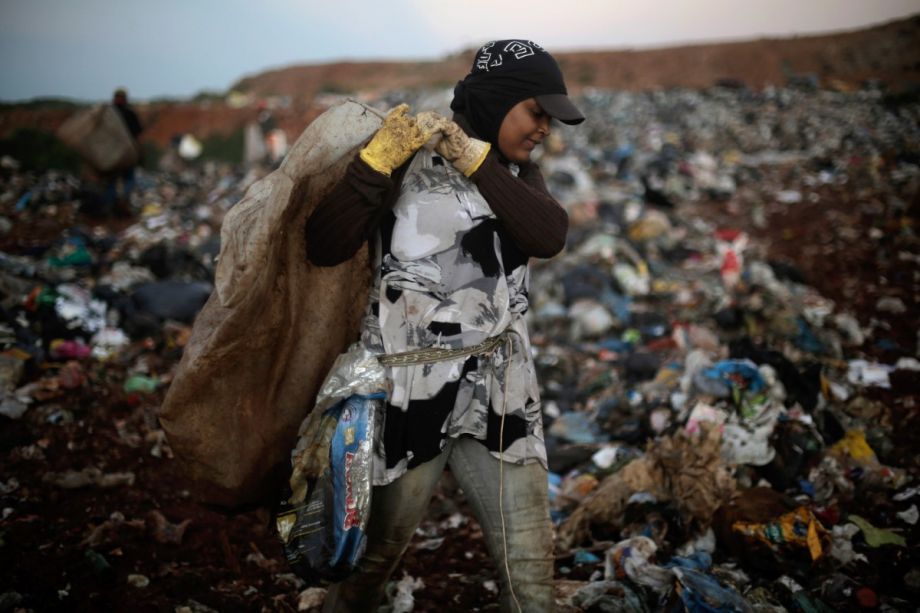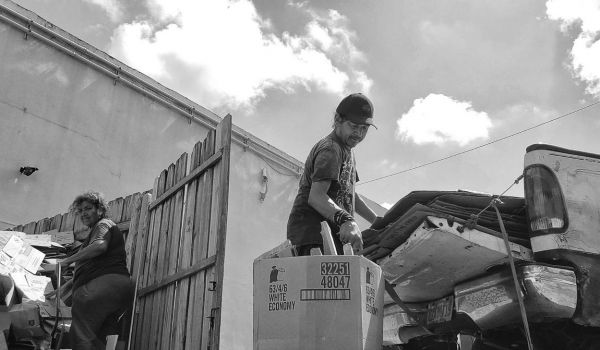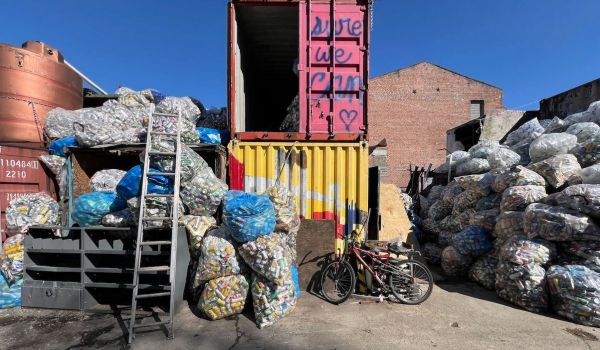Catadores. Cartoneros. Kabariwala. Zabaleen. From Buenos Aires to Cairo to Delhi, a class of workers with many names does just one kind of work: recycling. In open-air markets, city streets and waste dumps worldwide, millions of informal workers make their living by retrieving cardboard, plastic and other recyclable items from piles of trash.
If the job sounds dirty, it is. “Of course dealing with waste is not very fancy,” says Lucia Fernandez, a labor organizer with global nonprofit Women in Informal Economies: Globalizing and Organizing (WIEGO). “It smells really bad.”
But it’s also increasingly afforded public support. In Latin America and South Asia, waste-pickers have moved from a group often derided for uncleanliness and subjected to police harassment for theft, trespassing or vagrancy to a well-respected, working-class demographic. Can the flowering of respect for one of the dirtiest jobs on Earth improve the health of the people who do it?
The idea of improving the lives of waste-pickers isn’t new. In Latin America, labor organizing dates to 1980, when the Catholic Church helped found a group called the Association of Paper Pickers in Brazil. A separate project offering vocational training to recyclers in Cairo, Egypt, ran in the mid-1990s. WIEGO has worked with and for informal waste-pickers as they’ve begun to advocate for themselves.
“In the past 15 years, waste-pickers have been organized, mostly into cooperatives,” Fernandez says. “Before this, most of [the waste-pickers], I would say almost all of them, have been working on the streets by themselves, alone. When solid waste management gets modernized, upgraded or improved, municipalities and governments stop allowing them to work on that side. So to some extent they are forced to get organized to maintain their work as recyclers.”
Decades of organizing have made a positive impact. Societies worldwide — and particularly in Latin America — have now extended waste-pickers new forms of protection and inclusion. The government of Brazil granted the profession legal recognition in 2001, and Argentina now offers many waste-pickers a monthly stipend. In a recent conference with an organization called la Red Nacional de Recicladores de Ecuador (the National Network of Recyclers of Ecuador), program director Felipe Toledo of nonprofit Avina Foundation summed up the current perception: “We consider the activity of recycling a public service that recyclers do for society, and in no way should it be viewed as a concession that the society, government or private sector does for a vulnerable sector of the population.”
It’s a viewpoint that garbage collectors in the developed world already enjoy. In the U.S. and elsewhere, solid waste management is a well-regarded civil service position. Waste-pickers in the developing world provide the same essential service, advocates point out, and are particularly helpful where governments offer little to no garbage collection. They’ve also gained respect as merchants of ecological sustainability, as they retrieve a substantial percentage of a city’s recyclable items from its landfills.
As respect for waste-picking grows so too has attention to health issues of the workers.
Even when formalized and well-paid, the job involves a long list of risks to health. Pickers can encounter toxic fumes, sharp objects, and medical waste; suffer repetitive stress injuries from bending, carrying heavy loads, and walking long distances; and might be injured by motor vehicles on roadsides, or in dumps when unstable trash heaps slide.
Although protective equipment can help, most organizations have opted to press governments to ensure workers are included in universal health care programs and insurance schemes. In Buenos Aires, Fernandez attests, one large labor organization has “a very interesting service [for] their members where they can afford a dentist, they can afford a gynecologist, they can afford special medical care that, otherwise, in the past, they would never have the idea of being treated like that.” (WIEGO, the organization that employs Fernandez, does advocacy work focused on access to care for all informal workers, including but not limited to waste-pickers.)
Other, independent initiatives have combined healthcare with social inclusion. In Brazil, a crowdfunded project called “Pimp my Carroça” has offered free healthcare, dental care and even massages to self-employed trash pickers, while also providing free decorations (“pimping”) for the hand-pulled trash carts (“carroças”) of catadores (or “hunters,” the Brazilian term for trash-pickers). Founder and graffiti artist Mundano explains: “By adding art and humor to the cause, it became more appealing, which helped call attention to the catadores and improve their self-esteem.” The project has served over 170 workers in several Brazilian cities.
Targeted health interventions — for instance, providing access to tetanus and hepatitis vaccines for workers stuck with sharp metal objects or dirty needles — haven’t been a big focus of worker organizations. Ditto for protective equipment. “For some reason, they really hate to wear gloves,” Fernandez admits.
That said, she notes, “They really love to be protected by uniforms.” This is obvious in several nations: A self-organized Ecuadorian cooperative called la Asociación de Servicios de Reciclaje Amazonia Limpia de Nueva Loja created matching embroidered uniforms that literally label workers “gente emprendedora,” or entrepreneurs.
Although less useful for reducing exposures or injuries, uniforms may in fact be the most protective object — if only because they elevate the respect that workers often want.
The idea of social status as a key factor in physical health dates back to the late 1960s, when health researcher Sir Michael Marmot ran two massive studies on workers. The research, termed the Whitehall Study, followed over 20,000 civil service workers in the U.K. over time — and found that, within a given time period, those in lower-tier positions died at three times the rate of their more powerful counterparts. The study also established that the stress associated with lower-class positions (including, but not limited to, garbage collection) caused more frequent illnesses. Further studies have correlated lower work status to higher stress, as measured by cortisol, a hormone the body emits when stressed. Given that, an environment that promotes human dignity, inclusion and respect itself might be the best health innovation of all.
How else can public perception help these essential workers? Fernandez notes ordinary people can help recyclers by disposing of waste safely — avoiding, for instance, putting medical sharps or hazardous chemicals in with ordinary trash. “You need proper source segregation,” she says. “For workers not to deal with toxics, toxics should not be on the way.”
The “Health Horizons: Innovation and the Informal Economy” column is made possible with the support of the Rockefeller Foundation.

M. Sophia Newman is a freelance writer and an editor with a substantial background in global health and health research. She wrote Next City's Health Horizons column from 2015 to 2016 and has reported from Bangladesh, India, Nepal, Kenya, Ghana, South Africa, and the United States on a wide range of topics. See more at msophianewman.com.
Follow M. Sophia .(JavaScript must be enabled to view this email address)

















